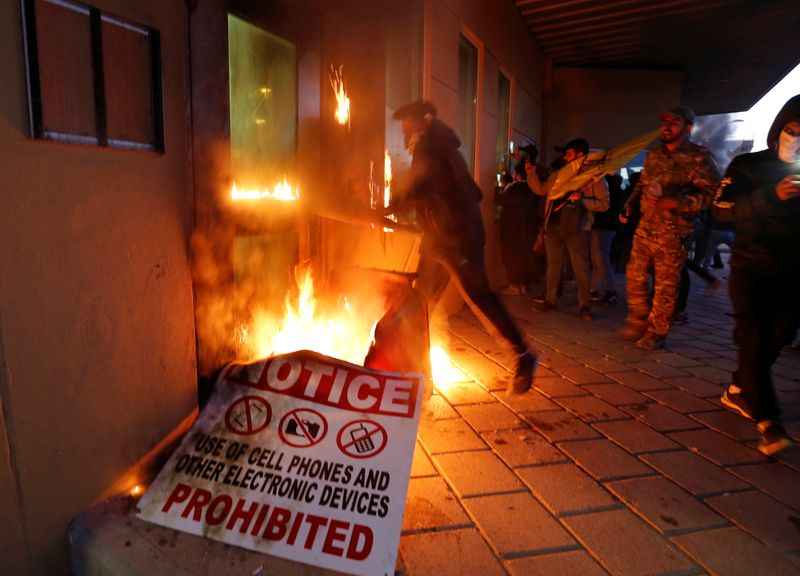By Ahmed Rasheed
BAGHDAD (Reuters) - Protesters enraged by U.S. air strikes on Iraq staged a violent demonstration outside the U.S. Embassy in Baghdad on Tuesday, setting fires ablaze and hurling stones as security forces and guards fired tear gas and stun grenades to repel them.
In Washington, U.S. President Donald Trump accused Iran of orchestrating the violence and said Tehran would be held responsible. More U.S. troops were being sent to the embassy, U.S. officials said.
The protests were led by Iranian-backed militias and lasted several hours, but the U.S. State Department said later that personnel were secure and the facility had not been breached.
A State Department spokesperson said reports from Iraqi officials that the ambassador had been evacuated were false. The envoy, Matt Tueller, had been on previously scheduled personal travel and was returning to the embassy, the official said. There were no plans for an evacuation.
The demonstration appeared to be an escalation of the proxy conflict between Washington and Tehran - a hugely influential player in Iraq - while mass protests are challenging Iraq's own political system nearly 17 years after the U.S. invasion that toppled Saddam Hussein.
It also shifted the focus of the mass protests away from the government and pro-Iran militias, and on to the United States.
U.S. air strikes on Sunday on Iranian-backed militia bases killed at least 25 fighters and wounded 55.
Those raids, on the Kataib Hezbollah militia, responded to the killing of a U.S. civilian contractor in a rocket attack on an Iraqi military base.
"Iran killed an American contractor, wounding many. We strongly responded, and always will," Trump said in a tweet. "Now Iran is orchestrating an attack on the U.S. Embassy in Iraq. They will be held fully responsible."
"NO AMERICA"
The protesters, including militiamen, torched a security post at the entrance of the embassy, Reuters witnesses said. The protesters threw stones at the gate while others chanted, "No, no, America! No, no, Trump!"
Iraqi special forces were deployed around the main gate to prevent protesters entering. U.S.-trained and -equipped Iraqi Counter Terrorism forces later reinforced them.
Medical sources said 12 militiamen were wounded by the tear gas and stun grenades fired to disperse the crowd.
The Washington Post reported that U.S. diplomats and staffers were huddled in a fortified safe room in the embassy, according to two reached by a messaging app.
A few hours into the protest, some of the militias encouraged protesters through loudspeakers to leave.
"We have delivered our message, please leave the area to avoid bloodshed," one announcement said.
Security guards inside the embassy also fired stun grenades at protesters outside the gates of the compound. Reuters correspondents heard at least seven loud bangs.
A Reuters witness saw blood on the face of one wounded militiamen and on the stomach of the other as their colleagues carried them away.
'CLOSED IN THE NAME OF THE PEOPLE'
Iraqis have been taking to the streets in their thousands almost daily to condemn, among other things, militias such as Kataib Hezbollah and their Iranian patrons that support Iraqi Prime Minister Adel Abdul Mahdi's government.
But on Tuesday it was the militias that protested, spraying "Closed in the name of the people" on the gates of the U.S. Embassy and smashing surveillance cameras around the building.
Qais al-Khazali, leader of the Asaib Ahl al-Haq militia, and many other senior leaders were among the protesters.
"Americans are unwanted in Iraq. They are a source of evil and we want them to leave," said Khazali, one of Iran's most important allies in Iraq.
Kataib Hezbollah is one of the smallest but most potent of the Iranian-backed militias. Its flags were hung on the fence surrounding the embassy.
U.S. Secretary of State Mike Pompeo spoke to Abdul-Mahdi and President Barham Salih by telephone from Washington and said they had guaranteed the safety of U.S. personnel and property.
"The Secretary made clear the United States will protect and defend its people, who are there to support a sovereign and independent Iraq," a State Department spokeswoman said.

More than 5,000 U.S. troops are stationed in Iraq supporting local forces, though Iraq has rejected any long-term presence of additional U.S. forces that crossed its border during an American withdrawal from northern Syria.